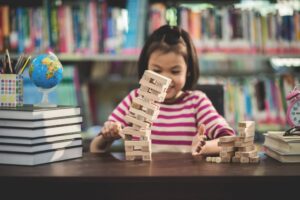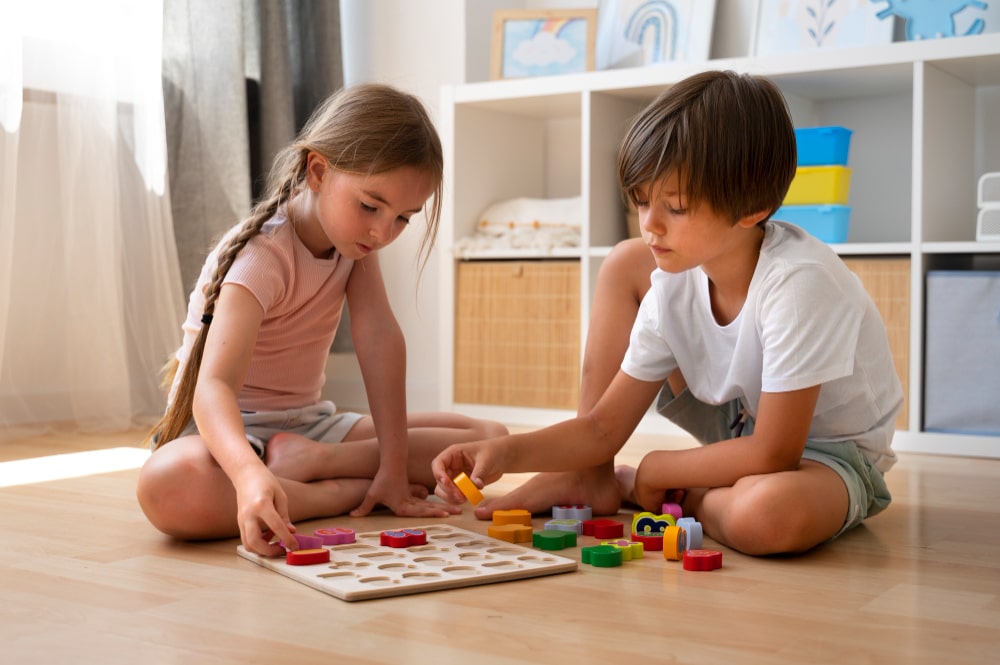The days where textbook learning forms a major part of the curriculum are gone. It’s now time to take on the active & fun-based learning approach. And this is where the importance of play-based learning comes into the picture.
We all know the importance of play-based learning in our kids day to day life. Yet we fail to get it involved actively in our kid’s early childhood.
And since a huge chunk of a child’s development occurs during their early years, it is imperative that we maximize the learning for them, and this is possible with the help of play-based learning.
Play Based Learning
Play-based learning is an approach to education that uses play as a tool to foster children’s intellectual, physical, social, and emotional growth. Activities in play-based learning settings are planned to pique children’s interest and encourage them to use their natural inclination like inquiry, discovery, and invention.

Many positive outcomes are associated with play-based learning like
- Enhances their problem-solving abilities
- Encourages independent thinking
- Fostering divergent thinking
Many teachers in the early education field now include elements of play-based learning in their curricula and lesson plans.
An extensive study on the importance of play-based learning has yielded findings demonstrating that it is strongly related to and associated with, the development of the child’s intellectual abilities, thinking, and motivation.
Importance of Play-based Learning
Here are some of the benefits of play-based learning for children-
Brain Development
Play is an important part of a child’s development since it helps them learn about the environment and lays the foundation for future cognitive progress. Toys, games, and other forms of sensory play in a stimulating setting give numerous learning opportunities. When children don’t get enough play, they lose the neural pathways that let them learn and develop via play.
The form of play, games, and toys has been proven by neuroscientists to have a profound effect on a child’s brain chemistry and growth. Specifically, the cerebral cortex, which is responsible for higher-level cognitive processing, may gain from both environmental enrichment and children’s play.
Facilitating Self Control and Emotional Stabilization
A vital component of academic preparedness is the ability to self-regulate. Children who are emotionally and behaviorally well-regulated are able to
- Wait patiently for their turn
- Avoid temptation while playing with peers,
- Manage their emotions well.
The self-control of one’s emotions is crucial not only for a child’s academics but also for his or her social and emotional growth.
Language Enhancement
Play-based learning helps children acquire new vocabulary and hone their linguistic abilities. They learn new words with their meanings and structures, and also make links between written and spoken forms of communication.
Felt boards with letters and drawings, or puppets with narrative situations, are two examples of learning tools that might be used in a play-based context. This allows kids the chance to act out tales, acquire new vocabulary terms, and enhance their communication skills, all while having fun.
Developing Creativity and Imagination
Creative thinking and imaginative play are associated with children from an early age. Children develop this kind of imagination via play and active learning, which equips them to deal with a wide range of experiences, both real and imagined.
Children are natural-born problem-solvers and innovators, and they show this when they play at being doctors, parents to their stuffed animal “children,” or pilots of cardboard box airplanes. As they mould biscuits out of playdough and don blankets as capes, kids learn to find possibilities in everyday objects.
Cognitive Growth
The cognitive growth of children is one of the most important advantages of play-based learning. Children learn, grow, and develop via play. Students benefit from this approach because it helps them develop both conceptual understanding and analytical reasoning. As a bonus, kids also hone their problem-solving skills while playing. Children learn to persevere when they are faced with adversity. Their ability to critically analyze a situation and find viable solutions to it is enhanced via this process.
Motor Development
Children develop their motor skills and coordination via play-based education as well. Children develop their hand-eye coordination, balance, as well as other fine and gross motor abilities, via play.
A game like hopscotch is a great example of how entertainment and education can be combined. Hopscotch lets kids develop their motor skills and number sense while having fun.
Social Development
Children’s play is a vital component of their overall social development. Free, active play with other people, including parents, siblings, and friends, is a great way to learn and practice social skills. Children develop their social abilities via pretend play and group games with their classmates.
Children learn how to get along with others, cooperate, obey rules, and exercise self-control through playing together.
Researchers in psychology discovered that toddlers’ popularity, social skills, and prosocial behavior were strongly correlated with how often and how realistically they engaged in fantasy play.
Children who exercise via play are more likely to be happy, well-adjusted, cooperative, and well-liked by their peers.
When kids play, they learn to empathize with others, which is a crucial step in expanding their social repertoire. Such kids grow into adults with wider compassion and awareness of the world’s perspectives.
Takeaway
While there is the importance of play-based learning in child education, it has its opponents. Moreover, the evidence for its effectiveness is well-known. Young children who are given the freedom to learn and grow through play are more prepared for future success in school and in life. Therefore, one must give importance to play-based learning in child education.





